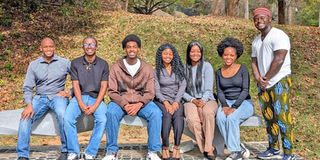Prime
Minja: Tanzanian-born academic offers advice for joining US universities

Dr Frank Minja (left) with some of Tanzanian students in Atlanta. PHOTO | COURTESY
What you need to know:
- Minja and his friends are dispelling the myth that scholarships are reserved for the wealthy and well-connected
Atlanta. United States universities rank among the elite higher learning institutions in the world. These universities have nurtured some prominent Tanzanians in the political and entrepreneurial sectors who have made a mark in the country.
Unsurprisingly, most young Tanzanians on their educational journey dream of getting a slot to attend one of these American universities. With the astronomical fees to gain a seat in one of their lecture halls, most Tanzanians eye the scholarship as the viable path to study there.
Contrary to conventional assumption, these scholarship opportunities are not reserved for the affluent, connected, or chosen few; any Tanzanian with the right high school grades and additional soft skills stands a chance to get a scholarship to study in one of these top-notch universities. This is the message Dr Frank Minja has relentlessly been telling young Tanzanians for years now.
Dr Minja a Tanzanian-born associate professor of neuroradiology at the Emory University School of Medicine, has dedicated much of his time to educating and guiding young Tanzanian students on how to get into US universities through available scholarship programs.
Alongside engineers Asante Malima and Boniphace Kutela, they have taken social media spaces from YouTube to Zoom meetings and posts on X to disseminate these critical messages to Gen Z in Tanzania and try to navigate them through the scholarship opportunities.
One of the biggest hurdles they are trying to repel is the notion that these scholarships are for the rich Tanzanians with influence; Dr Minja refutes the notion as a mere speculation that is further from the truth.
“One of the reasons we are conducting these sessions is because we want to raise awareness; the right information is not widely available; we want to make sure the right information is available for everyone and promptly,” he said.
Some people get the information when it’s too late, with the date of the final application deadline looming, which makes that information useless. So they started to target even younger Tanzanians just joining high school so that they can prepare them for their university future with even a four-year head start and give them a competitive edge.
These scholarships are open for all, but most Tanzanians are not privy to the information on how to successfully apply for one, and that is where Dr Minja is hoping to make a difference.
For a successful sponsorship, he explained, there are two vital stages: a student’s preparation to be competitive. At this stage, a student hones him/herself to make sure they are ready in all ways to have a better chance at securing the funded spot, and the next stage is the actual application process.
Dr Minja agrees that work needs to be done on our Tanzanian students to improve their proficiency in both stages.
“Tanzanian students do perform very well in written exams but lack soft skills,” he mentioned.
Expounding further on what soft skills are in this case, he noted that unlike in Tanzania, Americans value one’s other abilities besides the grades, like being able to explain yourself, writing personal statements, talking about their passion, and having prior leadership opportunities, among other things.
These qualities improve one’s chances of getting a US university scholarship slot. “In our secondary schools, getting the first division 1.7 and getting triple-A in A level, they just want you to pass the exams; even sports are discouraged; they just want you to read,” he pointed out.
Unfortunately, when it comes to the American system, that is not enough; many students are good in class, so for one to get a scholarship, they look at the extracurricular activities you engaged in and additional things that will make you competitive and improve your odds.
Communication skills and being able to present yourself are a huge plus for the applicants when they start reviewing the applications. Being punctual and following instructions can make or break the chances during the selection process.
“If they ask you to list 10 things and you only list 5, that shows you can’t follow simple instructions and you will be automatically disqualified even if you have division 1.7,” he said.
These are the things Dr Minja and his colleagues are grappling with: how to make Tanzanian students more competitive in these scholarships. This kind of information they share in their YouTube videos and their Zoom sessions, hoping that Tanzanian students, parents, and teachers are taking notes and improving accordingly.
He explained that there is a need to constantly study in preparation for exams one takes, like the SAT (Scholastic Assessment Test), a standardised test used for university and college admissions in the United States. The test is taken by high school students being assessed.
It involves testing their skills in math, writing, and reading. When it comes to the actual application process, it boils down to determining when you should apply, which universities you should apply to, and how many. Knowing all this makes a difference between a successful scholarship application or not, and all this is shared online for free to all Tanzanian youths hoping to take a seat in one of these prestigious universities in the US.
The videos they share are designed to make our Tanzanian students more competitive. Their main target is very junior students, those in form 1 and 2, knowing that these students have a better chance and time to work on themselves to improve their opportunity to get a scholarship once they finish high school.
They are also working against misinformation that is spread to students like people saying grades do not matter or these opportunities are only for rich families, which is not true.
“Some people say to get a scholarship you have to study in private schools like Feza or IST, which is not true,” he added.
“The advantage these private schools have is that they expose their students to soft skills, and government schools can decide to incorporate soft skills as well,” he added.
The availability of the information they share levels the field; all students have access to the same information, and what one does with it is what will make the difference.
“You don’t have to know me or my colleagues personally to stand a better chance of getting the scholarship; information is for everyone, and do what is required to win,” he said.
The information is also for parents, who do not know that this opportunity is available for their children; if parents get educated, they can teach their children what to do to get their studies funded.
He also observed that students who perform poorly in Form 4 are not because they are not intelligent but because they are not focused. They do not take their studies seriously. So having this information in Form 1 will make the students stay focused from early on.
At this time students are going through the puberty phase and testing independence from parents for the first time. So it’s a lot for a young mind to take in; that’s why they target them in hopes that they will help them keep their eyes on the prize.
He advises high schoolers who want to improve their performance in school to always surround themselves with like-minded people.
The people around you will influence what you do; if you surround yourself with people who do better than you, those with better study habits, you will most likely learn stuff from them. These are some of the practical things a student can do. When it comes to social media, a student can use those platforms to follow accounts that will help them learn something useful. In their video sessions, he brings Tanzanian students who won scholarships so that others can see, knowing that seeing is believing. “When they see other students just like them winning scholarships, it helps them live it possible, it doesn’t matter if no one in your family, community or village has ever been to university, you can be the first one” he insisted.
Dr Minja is very actively working on training specialists at the Muhimbili Hospital; he co-leads Road2IR.org, which established the first interventional radiology training in 2019. Interventional radiology allows doctors to use image-guided procedures to attend to patients without opening them up.




